Sir John Mills (1908-2005) was one of the most popular and beloved English actors. The Oscar-winner appeared in more than 120 films and TV films in a career stretching over eight decades. He often played people who are not at all exceptional, but become heroes because of their decency, bravery and good judgement.
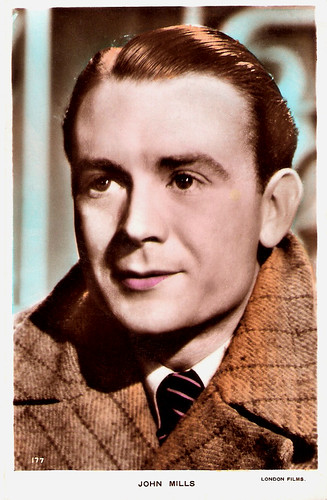
British postcard by Real Photograph, no. 177. Photo: London Films.
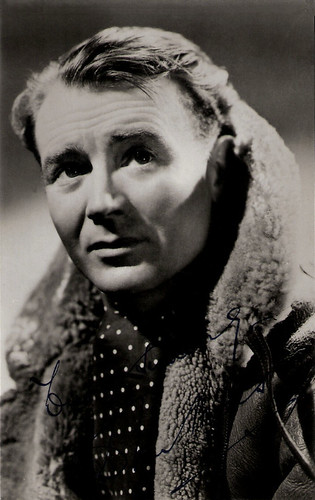
British autograph card. Photo: publicity still for The Way to the Stars (Anthony Asquith, 1945).
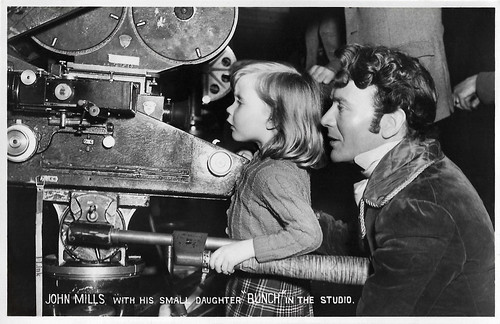
British postcard by Rotary Photo, London, no. F.S. 18. Caption: John Mills with his small daughter 'Bunch' in the studio. The picture was taken during the shooting of Great Expectations (David Lean, 1946). At the time, Juliet (or Bunch) must have been four years old. Juliet Mills is the elder sister of Hayley.
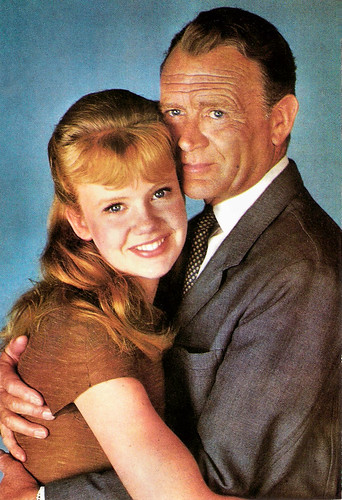
Spanish postcard by Postal Oscarcolor, no. 264. Publicity still for The Chalk Garden (Ronald Neame, 1964).
Sir John Mills, CBE was born Lewis Ernest Watts Mills in the seaside resort North Elmham, England, in 1908. He was the son of Edith (Baker), a theatre box office manager, and Lewis Mills, a mathematics teacher. It was the stage world, rather than his father's academic milieu, which most attracted the young Mills.
After a job as a clerk in a corn merchant's office, Mills moved to London, where he enrolled at Zelia Raye's Dancing School. He started his professional career in 1929 as a chorus boy in the revue The Five O'clock Girl at the London Hippodrome. He followed this with a cabaret act.Making as many contacts as possible, Mills was able to secure work on the legitimate stage.
Mills got a job with a theatrical company that toured India, China and the Far East performing a number of plays. Noël Coward saw him appear in a production of Journey's End in Singapore and wrote Mills a letter of introduction to use back in London. On his return Mills starred in The 1931 Revue, Coward's Cavalcade (1931) and the Noël Coward revue Words and Music (1932).
His film debut was in the quota quickie The Midshipmaid (Albert de Courville, 1932), a comedy with musical interludes starring Jessie Matthews. The following years, he learned his craft in such 'quota quickies', low-cost, quickly-accomplished films commissioned by American distributors active in the UK or by British cinema owners to satisfy the quota requirements.
Next Mills was a juvenile lead in the mystery The Ghost Camera (Bernard Vorhaus, 1933) with Henry Kendall and Ida Lupino. Wikipedia: "Despite being made quickly on a low budget, the film has come to be considered as one of the most successful Quota quickies made during the Thirties."
He then played lead roles in the musical Charing Cross Road (Albert de Courville, 1935), Brown on Resolution (Walter Forde, 1935) with Betty Balfour, Tudor Rose (Robert Stevenson, 1936) starring Cedric Hardwicke and Nova Pilbeam, and The Green Cockatoo (William Cameron Menzies, 1937).
He did Aren't Men Beasts? (1936) on stage and worked for Hollywood director Raoul Walsh in O.H.M.S. (1937). His Hollywood debut was in Goodbye, Mr. Chips (Sam Wood, 1939) with Robert Donat, but he refused the American studios' entreaties to sign a contract and returned to England.
John Mills joined the army in 1939 but occasionally made films on leave, such as the comedy Old Bill and Son (Ian Dalrymple, 1940) and the war film Cottage to Let (Anthony Asquith, 1941) with Leslie Banks. He also appeared in the classic In Which We Serve (Noel Coward, David Lean, 1942).
He relished acting in films and the cinema made him an internationally renowned star. His climb to stardom began when he had the lead role in We Dive at Dawn (Anthony Asquith, 1943), a film about submariners. He was top billed in This Happy Breed (David Lean, 1944), directed by from a Noël Coward play. The film was a big hit and director David Lean would go on to direct Mills in some of his most memorable performances.
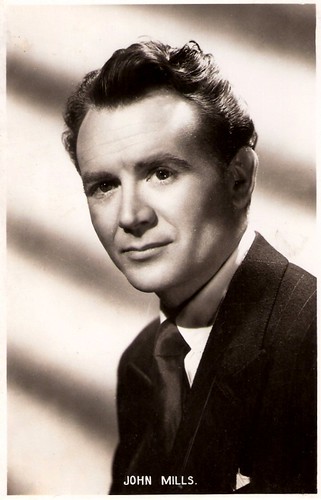
British Postcard, no. F. S. 23. Publicity photo for Scott of the Antarctic (1948).
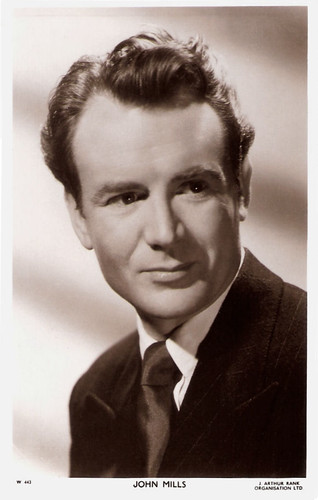
British postcard in the Picturegoer series, London, no. W 443. Photo: J. Arthur Rank Organisation Ltd.
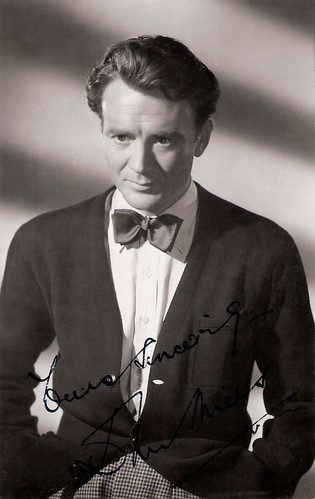
British postcard.
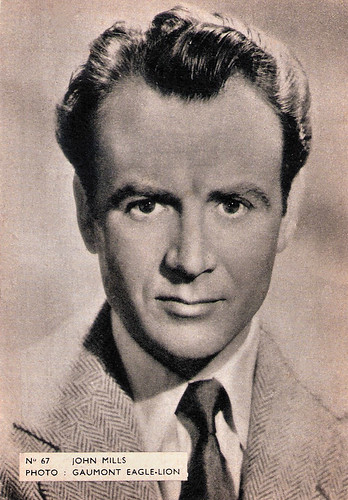
Belgian collectors card by Merbotex, no. 67. Photo: Gaumont Eagle-Lion.
After the war, John Mills took the lead in Great Expectations (David Lean, 1946). It was the third biggest hit at the British box office this year and Mills was voted the sixth most popular star. Subsequently he had another big hit as Captain Robert Falcon Scott in Scott of the Antarctic (Charles Frend, 1948). It was the fourth most watched film of the year in Britain and Mills was the eighth biggest star.
Over the next decade he made his career playing other traditionally British heroes and became particularly associated with war dramas, such as The Colditz Story (Guy Hamilton, 1954), Above Us the Waves (Ralph Thomas, 1955) with John Gregson and Donald Sinden, and Ice Cold in Alex (J. Lee Thompson, 1958). He is credited with playing more military roles than any other star. In 31 of his films, almost a third of his whole cinematic output, he portrayed soldiers, usually officers.
David Lean directed Mills in a memorable performance in the romantic comedy Hobson's Choice (1954) with Charles Laughton. Other significant films in which he appeared include War and Peace (King Vidor, 1956), The Chalk Garden (Ronald Neame, 1964), King Rat (Bryan Forbes, 1965), and Oklahoma Crude (Stanley Kramer, 1973).
With his daughter Hayley Mills he also appeared in Tiger Bay (J. Lee Thompson, 1959) and The Family Way (Roy Boulting, 1966) and had a cameo in her Disney hit The Parent Trap (David Swift, 1961). In 1966, Mills directed Sky West and Crooked (aka Gypsy Girl), which starred Hayley and was written by his wife, Mary Hayley Bell.
As he aged, his proclivity for well-written roles enabled him to make a seamless transition from a lead to character lead to character actor. For his role as the village idiot in Ryan's Daughter (David Lean, 1970) — a complete departure from his usual style — he won the Oscar for Best Supporting Actor.
For Richard Attenborough, Mills played in Young Winston (1972) and Gandhi (1982), with Ben Kinsley. Among his last films were Bean (Mel Smith, 1997) starring Rowan Atkinson, Bright Young Things (Stephen Fry, 2003) and Lights2 (Marcus Dillistone, 2005), his final film appearance as a tramp.
Altogether he appeared in over 120 films. Jon C. Hopwood at IMDb: "No male star of English cinema enjoyed such a long and rewarding career as a star while appearing predominantly in English films. As an actor, Mills chose his roles on the basis of the quality of the script rather than its propriety as a 'star' turn. Because of this, he played roles that were more akin to character parts". Mills was appointed a Commander of the British Empire in 1960 and was knighted in 1976.
His first wife was the actress Aileen Raymond, (1932-1941). After their divorce, he married the dramatist Mary Hayley Bell. Their marriage, on 16 January 1941, lasted for 64 years, until his death in 2005. He was 97. Mills and Bell had two daughters, actresses Juliet and Hayley Mills and one son, Jonathan Mills, a screenwriter. His grandson is Crispian Mills, the lead singer of the pop group Kula Shaker. John Mills' life, both off screen and on, was summed up in his autobiography Up in the Clouds, Gentlemen, Please (1980).
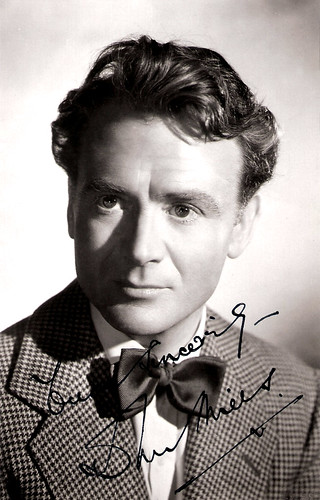
British autograph card.
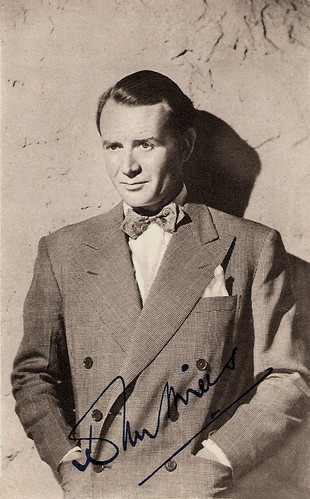
British postcard.
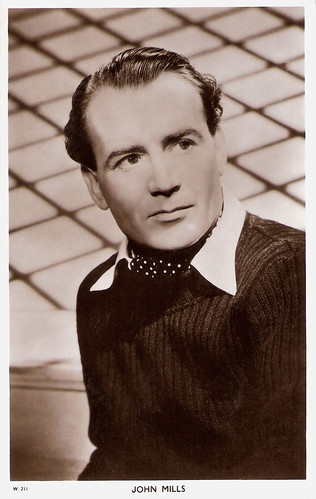
British postcard, no. W 211.
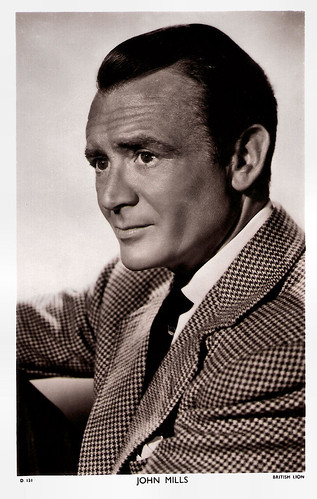
British postcard in the Picturegoer series, London, no. D 131. Photo: British Lion.
Sources: Jon C. Hopwood (IMDb), Hal Erickson (AllMovie), Wikipedia and IMDb.

British postcard by Real Photograph, no. 177. Photo: London Films.

British autograph card. Photo: publicity still for The Way to the Stars (Anthony Asquith, 1945).

British postcard by Rotary Photo, London, no. F.S. 18. Caption: John Mills with his small daughter 'Bunch' in the studio. The picture was taken during the shooting of Great Expectations (David Lean, 1946). At the time, Juliet (or Bunch) must have been four years old. Juliet Mills is the elder sister of Hayley.

Spanish postcard by Postal Oscarcolor, no. 264. Publicity still for The Chalk Garden (Ronald Neame, 1964).
Juvenile Lead
Sir John Mills, CBE was born Lewis Ernest Watts Mills in the seaside resort North Elmham, England, in 1908. He was the son of Edith (Baker), a theatre box office manager, and Lewis Mills, a mathematics teacher. It was the stage world, rather than his father's academic milieu, which most attracted the young Mills.
After a job as a clerk in a corn merchant's office, Mills moved to London, where he enrolled at Zelia Raye's Dancing School. He started his professional career in 1929 as a chorus boy in the revue The Five O'clock Girl at the London Hippodrome. He followed this with a cabaret act.Making as many contacts as possible, Mills was able to secure work on the legitimate stage.
Mills got a job with a theatrical company that toured India, China and the Far East performing a number of plays. Noël Coward saw him appear in a production of Journey's End in Singapore and wrote Mills a letter of introduction to use back in London. On his return Mills starred in The 1931 Revue, Coward's Cavalcade (1931) and the Noël Coward revue Words and Music (1932).
His film debut was in the quota quickie The Midshipmaid (Albert de Courville, 1932), a comedy with musical interludes starring Jessie Matthews. The following years, he learned his craft in such 'quota quickies', low-cost, quickly-accomplished films commissioned by American distributors active in the UK or by British cinema owners to satisfy the quota requirements.
Next Mills was a juvenile lead in the mystery The Ghost Camera (Bernard Vorhaus, 1933) with Henry Kendall and Ida Lupino. Wikipedia: "Despite being made quickly on a low budget, the film has come to be considered as one of the most successful Quota quickies made during the Thirties."
He then played lead roles in the musical Charing Cross Road (Albert de Courville, 1935), Brown on Resolution (Walter Forde, 1935) with Betty Balfour, Tudor Rose (Robert Stevenson, 1936) starring Cedric Hardwicke and Nova Pilbeam, and The Green Cockatoo (William Cameron Menzies, 1937).
He did Aren't Men Beasts? (1936) on stage and worked for Hollywood director Raoul Walsh in O.H.M.S. (1937). His Hollywood debut was in Goodbye, Mr. Chips (Sam Wood, 1939) with Robert Donat, but he refused the American studios' entreaties to sign a contract and returned to England.
John Mills joined the army in 1939 but occasionally made films on leave, such as the comedy Old Bill and Son (Ian Dalrymple, 1940) and the war film Cottage to Let (Anthony Asquith, 1941) with Leslie Banks. He also appeared in the classic In Which We Serve (Noel Coward, David Lean, 1942).
He relished acting in films and the cinema made him an internationally renowned star. His climb to stardom began when he had the lead role in We Dive at Dawn (Anthony Asquith, 1943), a film about submariners. He was top billed in This Happy Breed (David Lean, 1944), directed by from a Noël Coward play. The film was a big hit and director David Lean would go on to direct Mills in some of his most memorable performances.

British Postcard, no. F. S. 23. Publicity photo for Scott of the Antarctic (1948).

British postcard in the Picturegoer series, London, no. W 443. Photo: J. Arthur Rank Organisation Ltd.

British postcard.

Belgian collectors card by Merbotex, no. 67. Photo: Gaumont Eagle-Lion.
Traditionally British Heroes
After the war, John Mills took the lead in Great Expectations (David Lean, 1946). It was the third biggest hit at the British box office this year and Mills was voted the sixth most popular star. Subsequently he had another big hit as Captain Robert Falcon Scott in Scott of the Antarctic (Charles Frend, 1948). It was the fourth most watched film of the year in Britain and Mills was the eighth biggest star.
Over the next decade he made his career playing other traditionally British heroes and became particularly associated with war dramas, such as The Colditz Story (Guy Hamilton, 1954), Above Us the Waves (Ralph Thomas, 1955) with John Gregson and Donald Sinden, and Ice Cold in Alex (J. Lee Thompson, 1958). He is credited with playing more military roles than any other star. In 31 of his films, almost a third of his whole cinematic output, he portrayed soldiers, usually officers.
David Lean directed Mills in a memorable performance in the romantic comedy Hobson's Choice (1954) with Charles Laughton. Other significant films in which he appeared include War and Peace (King Vidor, 1956), The Chalk Garden (Ronald Neame, 1964), King Rat (Bryan Forbes, 1965), and Oklahoma Crude (Stanley Kramer, 1973).
With his daughter Hayley Mills he also appeared in Tiger Bay (J. Lee Thompson, 1959) and The Family Way (Roy Boulting, 1966) and had a cameo in her Disney hit The Parent Trap (David Swift, 1961). In 1966, Mills directed Sky West and Crooked (aka Gypsy Girl), which starred Hayley and was written by his wife, Mary Hayley Bell.
As he aged, his proclivity for well-written roles enabled him to make a seamless transition from a lead to character lead to character actor. For his role as the village idiot in Ryan's Daughter (David Lean, 1970) — a complete departure from his usual style — he won the Oscar for Best Supporting Actor.
For Richard Attenborough, Mills played in Young Winston (1972) and Gandhi (1982), with Ben Kinsley. Among his last films were Bean (Mel Smith, 1997) starring Rowan Atkinson, Bright Young Things (Stephen Fry, 2003) and Lights2 (Marcus Dillistone, 2005), his final film appearance as a tramp.
Altogether he appeared in over 120 films. Jon C. Hopwood at IMDb: "No male star of English cinema enjoyed such a long and rewarding career as a star while appearing predominantly in English films. As an actor, Mills chose his roles on the basis of the quality of the script rather than its propriety as a 'star' turn. Because of this, he played roles that were more akin to character parts". Mills was appointed a Commander of the British Empire in 1960 and was knighted in 1976.
His first wife was the actress Aileen Raymond, (1932-1941). After their divorce, he married the dramatist Mary Hayley Bell. Their marriage, on 16 January 1941, lasted for 64 years, until his death in 2005. He was 97. Mills and Bell had two daughters, actresses Juliet and Hayley Mills and one son, Jonathan Mills, a screenwriter. His grandson is Crispian Mills, the lead singer of the pop group Kula Shaker. John Mills' life, both off screen and on, was summed up in his autobiography Up in the Clouds, Gentlemen, Please (1980).

British autograph card.

British postcard.

British postcard, no. W 211.

British postcard in the Picturegoer series, London, no. D 131. Photo: British Lion.
Sources: Jon C. Hopwood (IMDb), Hal Erickson (AllMovie), Wikipedia and IMDb.
3 comments:
I particularly loved this post, as I had never realized that he played the village idiot in Ryan's Daughter.
Thank you for stopping by. I visited your blog in return, and really loved what you're doing. So I linked you, and you're now officially one of my 'Stars in the Blogosphere'. Ha): Greetings from Amsterdam.
Happy greetings indeed, and I truly love your blog as well :)
Post a Comment